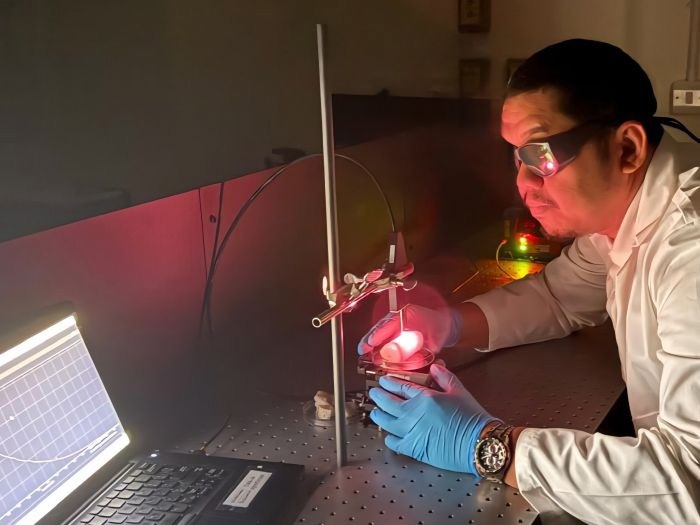A new method combines artificial intelligence with a laser-based technique called Raman spectroscopy to distinguish between tissue types like bone, fat, and muscle commonly encountered in orthopedic and neurosurgical procedures. By identifying the unique biological signatures that guide AI tissue classification, it lays the foundation for smart surgical tools with the added feature of biomolecular-level precision.
 Dr. Azhar Zam, Associate Professor of Bioengineering, NYU Abu Dhabi, measuring bone with Raman Spectroscopy. Image Credit: American Society for Laser Medicine and Surgery, Inc. (ASLMS)
Dr. Azhar Zam, Associate Professor of Bioengineering, NYU Abu Dhabi, measuring bone with Raman Spectroscopy. Image Credit: American Society for Laser Medicine and Surgery, Inc. (ASLMS)
The study, by Soha Yousuf, PhD and a team from New York University Abu Dhabi, is titled “Differentiation of Healthy Ex Vivo Bovine Tissues Using Raman Spectroscopy and Interpretable Machine Learning.” The basic science article, published in Lasers in Surgery and Medicine (LSM), the official journal of the American Society for Laser Medicine and Surgery, Inc. (ASLMS), was selected as the August 2025 Editor’s Choice.
“We conducted this study to empower surgeons with better decision-making tools during orthopedic and neurosurgical procedures by revealing the unique biomolecular signatures of commonly encountered tissues—something traditional techniques often miss,” said Yousuf.
The authors aimed to support real-time, informed surgical decision-making by identifying key Raman biomarkers that distinguish each tissue type and enhance the transparency of the machine learning models driving those decisions. Together, the models developed delivered high classification performance and interpretable outputs that offer molecular-level insights.
“By integrating Raman spectroscopy with interpretable machine learning, we not only identified key tissue biomarkers but also illuminated how these features guide classification decisions,” she continued. “This represents a significant step toward building smart, transparent technologies that can enable safer, more precise, and trustworthy real-time surgical guidance.”
Soha Yousuf is a postdoctoral associate at the Laboratory for Advanced Bio-Photonics and Imaging (LAB-PI) at New York University Abu Dhabi. Her research focuses on optical sensing technologies, mainly Raman spectroscopy, in combination with machine learning for tissue classification applications. She also conducts projects to advance Surface-Enhanced Raman Spectroscopy (SERS) platforms for biomedical applications. She received her PhD in Electrical and Computer Engineering from Khalifa University, United Arab Emirates